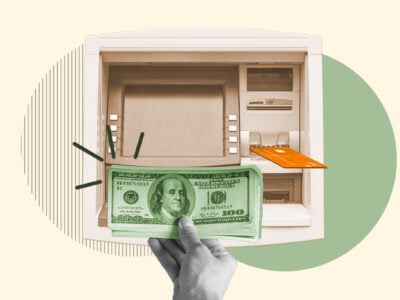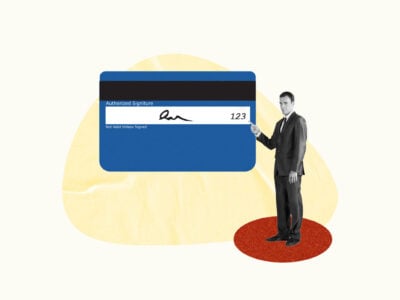You’re probably used to entering a 4-digit PIN every time you use your debit card at a store or ATM. But rarely do we punch in PINs when using our credit cards, so it may be a shock to you when suddenly you’re asked to enter one.
Don’t worry—we’ll walk you through everything you need to know about the enigmatic credit card PIN, including how to find yours (or get one if you don’t already have it), and when you do and don’t need a PIN when using your card.
Table of Contents
What is a credit card PIN?
A credit card PIN (personal identification number) is a set of 4 digits that are either determined by you or by your credit card issuer. You may need to enter those 4 digits when you make certain purchases or use your credit card for cash advances.
Credit card PINs are intended as an extra layer of security against credit card theft, and are the titular feature of PIN-and-chip credit cards.
Do I need a PIN for my credit card?
You may need a PIN for your credit card, depending on the issuer and how you plan on using your card. For instance, you’ll often need a PIN to use an ATM or make foreign transactions.
Keep in mind that some credit card issuers don’t actually offer PINs, in which case you won’t be able to use that card in those situations.
In more detail, here’s when you may need to enter a PIN when using your credit card:
At an ATM
To get cash out of your credit card, you need to make a credit card cash advance. Cash advances can be done at banks, online, through money orders, or (most commonly) at an ATM.
When making an ATM cash advance, though, you’ll likely need to enter your credit card’s PIN.
If you know your PIN, cash advances can be helpful for taking out money in a pinch. However, they should be reserved for cases of emergency, as cash advances tend to be expensive due to cash advance fees and high interest rates.
In a foreign country
When traveling abroad, especially in Europe, your credit card payments might require a PIN. This depends on the card issuer, the country, and the payment mechanism.
However, if you find yourself outside of the US and only have your credit card as a source of funds, make sure you know your PIN ahead of time. Otherwise, bring an additional source of payment.
At a payment kiosk
Some payment kiosks—like public transportation ticket machines—require PINs when you pay with a credit card. Once again, this is more common abroad (especially in Europe), but it can happen in the US as well.
How do I find my credit card PIN?
There are a few ways you can find your credit card PIN:
- Online: You can get your PIN by logging into your credit card account on your card issuer’s website. This method may or may not work, as many credit card issuers choose not to disclose safety information, like PINs, online.
- In your offer letter: When you received your credit card in the mail, you probably also got an offer letter that detailed its rates, fees, and terms. You may have also been given a PIN. Once again, this depends on the card issuer, as some credit card companies don’t offer PINs at all, or don’t determine PINs on the borrower’s behalf.
- By calling your issuer. If you can’t find your PIN in your account information or offer letter, call the number on the back of your credit card and ask. They may tell you your PIN over the phone after you’ve proven your identity (e.g., by giving the last 4 digits of your Social Security number), but it’s more likely they’ll just send you a new PIN in the mail.
How do I get a credit card PIN?
If you don’t yet have a credit card PIN, here’s how you can get one:
- By activating your card: When you get your credit card in the mail, you’ll be asked to go through the credit card activation process. This requires you to either go to a specific web address and follow the steps, or call a number listed on the card. You’ll likely be asked to set your own PIN if the credit card comes equipped with PIN capabilities.
- By calling your issuer: Call the number on the back of your card and request a PIN. From there, they’ll give you a PIN over the phone, mail you one via letter, or ask you to set your own PIN over the phone or online.
How can you use a credit card without a PIN?
Luckily, credit card PINs aren’t commonly used for transactions in the US, so don’t panic if you aren’t sure whether your card has a PIN or what it is.
Here’s how you can use a credit card without a PIN.
For US transactions
Most US credit card transactions don’t require a PIN. When you tap, swipe, or insert your card at stores and other establishments, you’ll almost never be asked for a PIN.
However, if you do try to make a purchase that won’t go through without a PIN, try the following:
- Use an alternative source of payment, like cash or a debit card.
- Buy the product online. Online transactions will require your credit card number (the string of numbers printed on the front or back of your credit card, which will generally be 15 or 16 digits long). However, they won’t require a PIN.
For foreign transactions
If you’re planning a trip and expect to be using a credit card abroad as your main money source, make sure you check your credit card PIN ahead of time. If you don’t have one or don’t know yours, consider:
- Carrying other methods of payment on you, like debit cards and cash.
- Getting a new credit card before going abroad. Look for a card specifically advertised as a PIN-and-chip card, then see if you can set your PIN yourself so you aren’t at risk of forgetting the numbers when you’re out of the country. While you’re at it, consider finding a credit card with no foreign transaction fees that offers credit card miles as rewards.
For cash advances
If you need to take money out and don’t have enough funds in your checking account, you may need to get cash from your credit card. While cash advances at ATMs will almost always require a PIN, there are alternatives to consider.
You can:
- Go to a 7-Eleven or Western Union and take out a money order.
- Make an online wire transfer from your credit card account to your checking account.
- Ask a friend for money, or offer to make a purchase for them with your credit card in exchange for the cash value.






